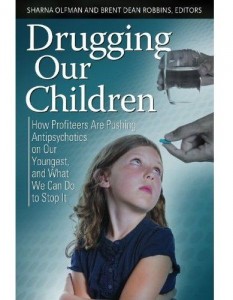The 2012 book Drugging Our Children: How Profiteers Are Pushing Antipsychotics on Our Youngest, and What We Can Do to Stop It, is edited by Sharna Olfman PhD, and Brent Dean Robbins, PhD. It is a collection of ten articles, plus an Introduction and an Afterword by Sharna Olfman. Here are the chapter titles, with a quote from each:
Introduction, by Sharna Olfman, PhD
“…they [antipsychotics] constitute such an assault to a child’s body and brain that it is hard to fathom why they are being prescribed so widely and casually, when safer and more effective and humane treatment modalities already exist.” [p xiii]
1. Weighing the Evidence: What Science Has to Say about Prescribing Atypical Antipsychotics to Children, by Robert Whitaker
“The drugs’ disruption of normal functioning along these various neuronal pathways causes many predictable adverse events.” [p 7]
2. From Ice Pick Lobotomies to Antipsychotics as Sleep Aids for Children: A Historical Perspective, by Brent Dean Robbins
“The era of moral treatment teaches us that successful treatment of many forms of mental illness requires neither biological explanations nor medical specialty.” [p 24]
3. Drugging Our Children: A culture That Has Lost Its Compass, by Sharna Olfman
“Sadly, it appears that support for families in the United States continues to deteriorate in lockstep with the rise in psychiatric disturbances.” [p 48]
4. The Marketing of Madness and Psychotropic Drugs to Children, by Gwen Olsen
“Children are a lucrative expansion market for any drug, particularly one that requires lifelong maintenance therapy once initiated.” [p 53]
5. Pediatric Antipsychotics: A Call for Ethical Care, by Jacqueline A Sparks and Barry L. Duncan
“When the evidence is explored, no reasonable scientist or practitioner would come down on the side of a favorable risk/benefit profile for pediatric use of antipsychotics.” [p 87]
6. Legal Issues Surrounding the Psychiatric Drugging of Children and Youth, by Jim Gottstein
“The horrific use of neuroleptics on defenseless children and youth cries out for legal efforts to curtail the practice.” [p 115]
7. Drug-Free Mental Health Care for Children and Youth: Lessons from Residential Treatment, by Tony Stanton
“One of the first things we observed in the records sent to us was a death of curiosity. This was due, in part, to the rush to impose a diagnostic label. Once the diagnosis was applied, curiosity was no longer necessary. The goal had been reached: the child’s behaviors and symptoms were placed in their proper category. In the records sent to us, we saw the repeated implication that there was nothing left to describe or discover. In particular, the child’s living connections with caretakers and their history had become irrelevant. A logical result was that clues about the origins of symptoms like those we found for Mark or Jim, didn’t need to be pursued.” [ p 129]
8. Strategic Family Therapy as an Alternative to Antipsychotics, by George Stone
“Psychiatry assumes that a child’s psychological issues are biological events that have no meaning and sweeps the important social and contextual information that is being conveyed under the rug of genetic malfunction.” [ p 147]
9. How Parents Can Improve Their Children’s Developmental Trajectories, by Adena B. Meyers and Laura E. Berk
“Little attention is paid to the many risk and protective factors that may influence children’s trajectories over time. Instead, there is a tendency to reify diagnostic labels while losing sight of their hypothetical nature. This may create the erroneous impression that a tangible disease entity with known causes, processes, and treatment mechanisms permanently resides within each affected child.” [p 154]
10. Building Healthy Minds: It Takes a Village, by Stuart Shanker
“In order for primary care physicians to play the central role that I have outlined, they will need to make a major modality shift, away from treating symptoms with psychiatric drugs to addressing the causes.” [ p 183]
Afterword, by Sharna Olfman
“Record levels of psychiatric disturbance, violence, poverty, apathy, and despair among our children speak to our current cultural crisis.” [p 187]
This is a well-written and compelling book. It describes, in detail, psychiatry’s shameful, destructive, and widespread drugging of our children. But it also offers a conceptual framework and practical suggestions for breaking free from the psychiatric-pharma destruction.
I highly recommend this book for parents, mental health workers, and anyone who has an interest in the welfare of our children.
